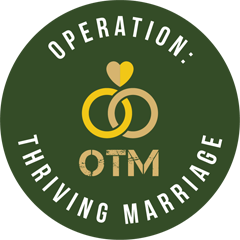A few weeks ago in a conversation with a friend, the topic of Roe v. Wade came up. As we talked about the US Supreme Court’s decision, he asked me if I was going to address it here. I told him no. I didn’t see how this particular decision was relevant to building a thriving marriage.
Yes, I know that this is a huge cultural shift in the United States. I know that this affects thousands of people as they wrestle with decisions before them and in their past. I know that the decision is significant, but I didn’t see it as specifically relevant to what we do here.

My friend pointed out to me that there is something about this decision that should probably be addressed here.
What if you and your spouse disagree about the Supreme Court’s decision? What if you disagree about other significant issues? How do you have a thriving marriage when you disagree on things that one or both of you think are important.
These emotionally charged issues can be significant struggles in a marriage. In some cases such disagreements cause couples to question the health of their marriage. I’ve even heard of couples considering divorce because they felt they could not live with someone who disagrees on such an important issue.
So what should you do when you find yourselves disagreeing on issues that you feel are important? How do you manage these intense emotional conflicts?
- Remember your marriage is more important than whatever the issue is that you are facing.
This does not mean that the issue you are facing is unimportant. It means that you have to correctly prioritize the issue and your marriage. In the end, your marriage is a greater priority than this argument. Even arguments over doctrine carry a lower priority than your marriage. In 1 Corinthians 7:12-14, Paul tells believing men and women not to divorce their unbelieving spouses. Our commitment before God to our spouses is one of the highest commitments we have ever made. We must maintain it as a priority.
- It is not your job to change your spouse’s mind.
We often say that marriage is about holiness not happiness. Time and time again we emphasize that your spouse is there to make you more holy. It is easy to think in these cases that our role is to convince our spouse of our side because our position is clearly the godly one. We even have Scripture to back up our position. What happens when your spouse is equally convinced that their position is the godly one and they have Scripture to back it up? This quickly becomes a me against you proposition rather than a Team Marriage approach. Which one do you think builds unity in a thriving marriage?
Here’s the thing. Holiness isn’t what you think. It’s what you do. No, I’m not saying you earn salvation by what you do. Salvation was earned for you by Jesus and what he did on the cross. The only thing you can do is put your faith in Him. Once you have received that salvation, though, you grow in holiness, not in doctrinal correctness, but in living a godly life. God made you holy through the washing of Jesus’ shed blood. You grow in that holiness by how you live in light of that reality. In these cases of intense disagreement, you help each other grow in holiness not by convincing your spouse of your side, but by loving each other through the disagreement.
- Never stop loving.
The rulers, powers, and spiritual forces of darkness want to destroy your marriage (Eph 6:12, John 10:10). They want to undo the work that God is doing in and through you. They will use these conflicts to attempt to put a wedge between you and create distrust in your marriage. But, the one who is in you is greater than the one who is in the world and he has come to give you life to the fullest (1 John 4:4, John 10:10). The Holy Spirit can use this same conflict to teach you how to love each other when you disagree. As you learn this deeper love it will bring you closer together and build greater oneness in your marriage. This love will be a testimony to the world of the power of God. The world does not understand how to live together in peace and disagreement. The impulse to separate and form different communities based on thoughts and opinions is of the devil. The power of God brings differences together and says His love and power is greater than all.
In your marriage there will be conflict. You will disagree. In the midst of this conflict you will strengthen your marriage if you prioritize your marriage, do not demand that your spouse change their mind, and never stop loving them.

